NRPB Study - A Lemon?
- Invisible Enemy

- Aug 7, 2025
- 5 min read
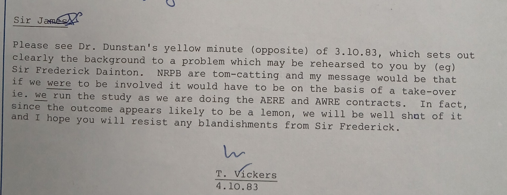
New evidence uncovered at The National Archives shows that the Medical Research Council were extremely concerned by the NRPB study into the Nuclear Test Veterans and just how independent the study would be. One letter even states that the 'Outcome appears likely to be a lemon, we will be well shot of it'
In 1983, the NRPB conducted the first epidemiological study into the Nuclear Test Veterans, concentrating on cancer and mortality. The UK Government have always insisted that it was independent, but we know that the MOD rewrote the conclusion to fit their narrative. Now, as further evidence is uncovered, the Medical Research Council had serious concerns regarding the study.
On the 3rd of October 1983, discussions within the MRC (Medical Research Council), the NRPB (National Radiological Protection Board) and the MOD (Ministry of Defence) were underway to obtain the contract for a study. Eventually, the NRPB (National Radiological Protection Board) were awarded the contract.
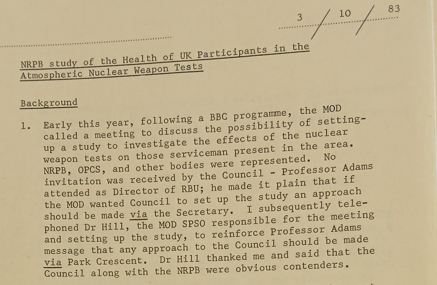
It seems as if the contract award was a two-horse race between the MRC and the NRPB.

The NRPB protocol was already in question at this early stage.
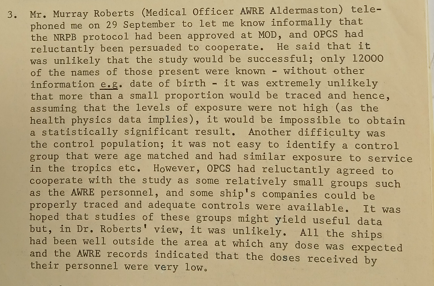
The OPCS (Office of Population Censuses and Surveys) had been contacted to identify the men involved in the study and had 'reluctantly been persuaded to cooperate'.
At the start, 'only 12,000 of the names of those present were known - without other information, e.g. date of birth - it was extremely unlikely that more than a small proportion would be traced.'
OPCS only agreed to cooperate with the study as some relatively small groups, such as the AWRE personnel, and some ship companies could be properly traced, and adequate controls were available. It was hoped that studies of these groups might yield useful data, but, in Dr Roberts' view, it was unlikely.
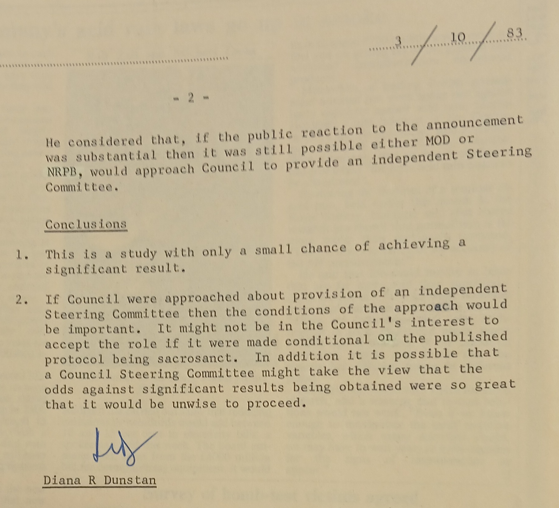
Concluding the letter Dr Dunstan states that 'This is a study with only a small chance of achieving a significant result.'
The letter also states that 'It might not be in the Councils interest to accept the role (steering committee) if it were made conditional on the published protocol being sacrosanct.'
'In addition, it is possible that the odds against significant results being obtained were so great that it would be unwise to proceed.'
Yet the study went ahead. The NRPB were awarded the contract.
A telephone conversation was held between Dr Dunstan and Dr Alderston of the OPCS.

OPCS insist that the MRC are involved in the study, especially in the design and interpretation of the data. Stating that 'the member of staff at NRPB (Dr Reissland) most concerned with the study was very happy with his suggestions - he was not however sure that this was true of Mr Dunster et al.'
The OPCS were concerned with the validity of individuals in the study.
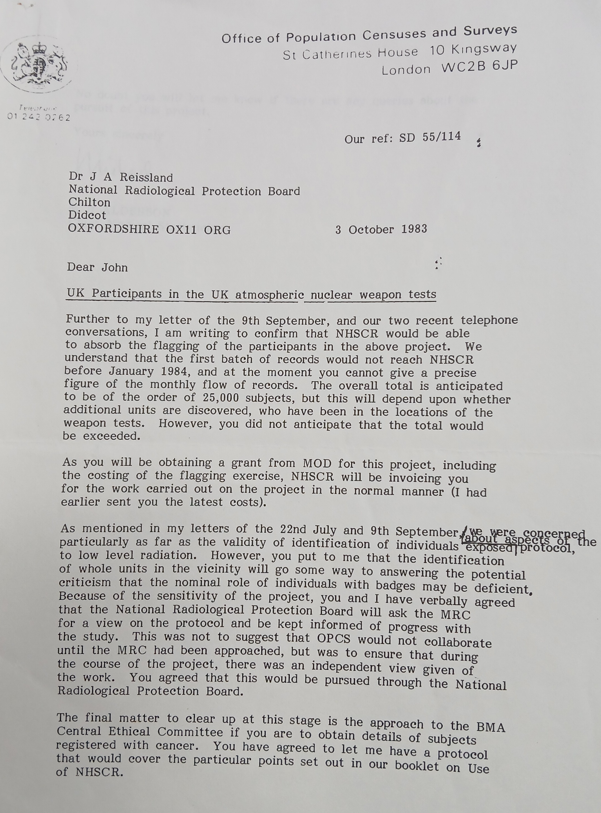

The OPCS also insisted that the MRC were involved as they did not trust the independent nature of the NRPB. They were also concerned about Ethical Committee approval for obtaining details of subjects registered with cancer.
The AWRE then wrote to the Medical Research Council asking for the release of data already held by the MRC on the 1600 AWRE personnel that the MRC already held:
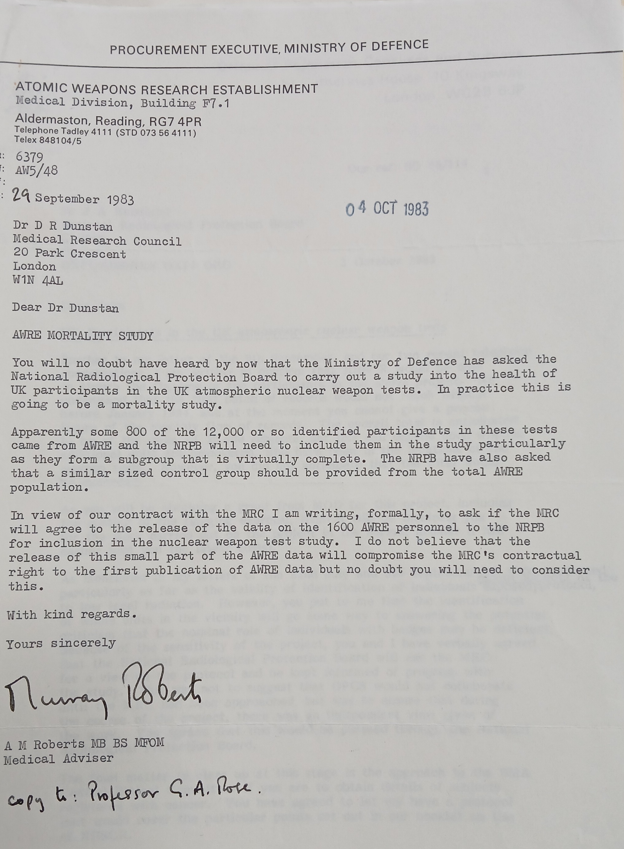
Confirmation from Dr James is then sought internally:

Professor Rose (London School of Hygiene and Tropical Medicine) replies:
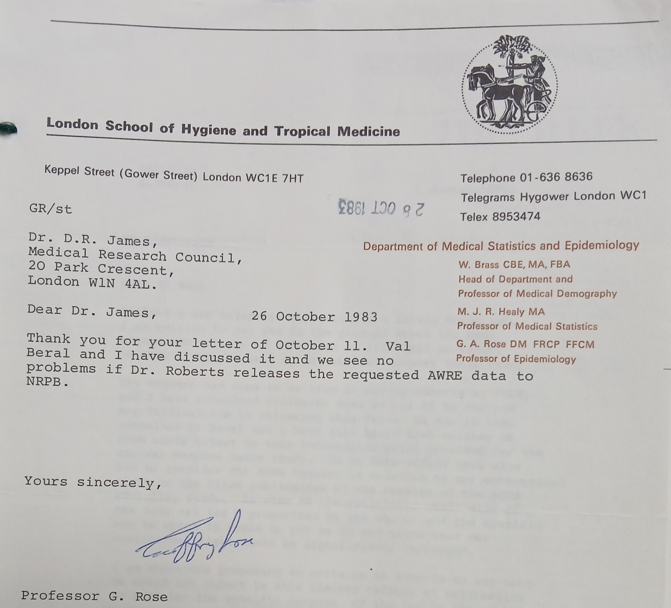
A further conversation is held with Dr Alderston (OPCS) in November 1983:
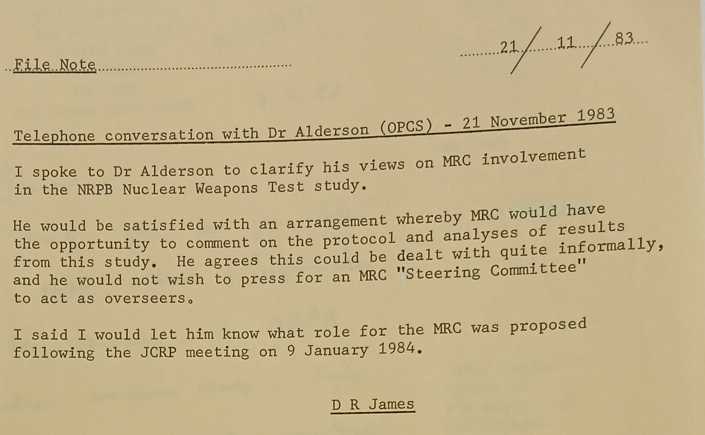
Dr Alderson has now changed his mind and would be happy for the MRC to comment on the protocol and analyses of results from this study. He agrees this could be dealt with quite informally, and he would not wish to press for an MRC "Steering Committee" to act as overseers.
The MRC had already received blood samples from individuals who believed they were exposed to radiation. They were not analysed because the MRC may have been involved in sampling slides from exposed and control populations, but the NRPB were instead asked to undertake the epidemiological study.
As the MRC were not involved in the study, they analysed the results anyway:
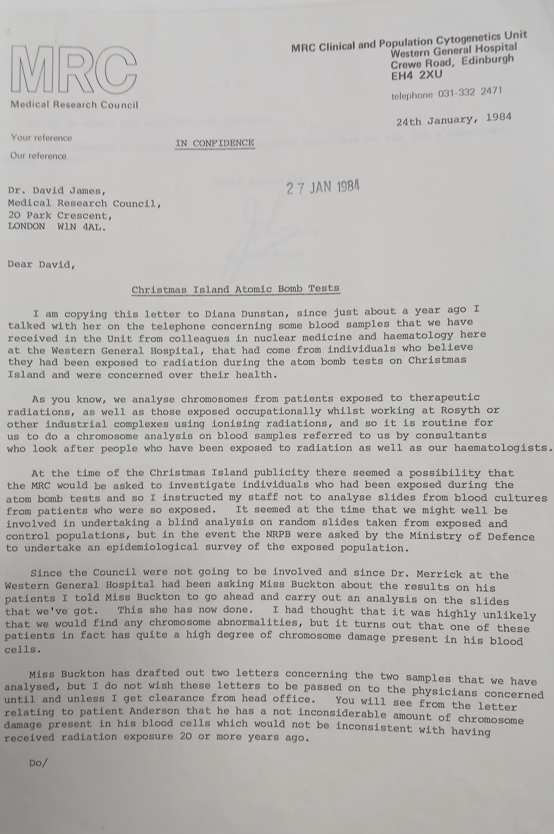
Patient Anderson's blood showed a high degree of chromosome damage present in his blood cells. This would not be inconsistent with having received radiation exposure 20 or more years ago.
Letters were drafted to be passed on to the physicians concerned, but Dr Evans needed clearance before sending them.
This is the letter to patient Anderson's consultant:
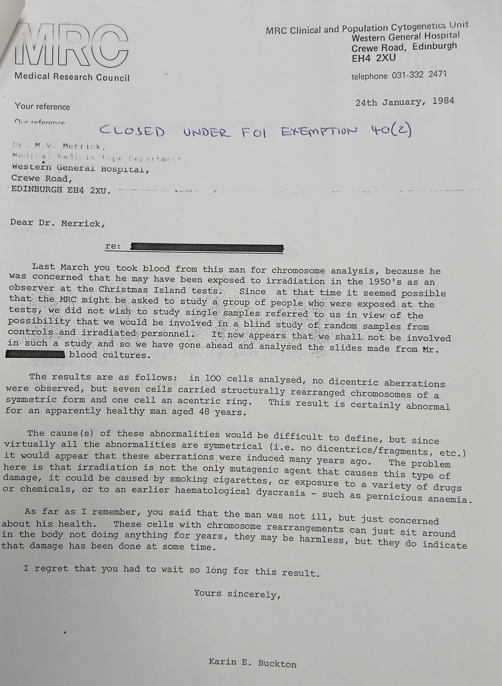
As the abnormalities are symmetrical, it would appear that these aberrations were induced many years ago. (Remember this patient is only 48). Mr Anderson's DNA was damaged by an event many years ago; it could be another incident or disease, as is the nature of mutagenic agents.
This evidence shows that in 1984, the MRC were aware of potential damage to the DNA of the participants of the nuclear tests. They pushed for a study using blood samples, but instead, the UK Government chose to undertake a cancer and mortality study, with the potential outcomes questionable.
Dr Roberts knew this study was questionable:

The NRPB was viewed as an arm of the government, and its scientific record (e.g. the estimate of deaths due to the Windscale accident) was poor. Yet the UK Government continued with them as the partner for this study.
Conclusion
It was the view of the BNTVA at the time that this study was not fit for purpose, the methods were questionable, and the outcomes were just a statistical exercise and proved nothing. Yet the UK Government still rewrote the conclusion.
The MRC were concerned, the OPCS were reluctantly involved, and the MRC had evidence of chromosomal damage.
So the question is, if a patient was found to have abnormally high levels of chromosomal damage, why did the UK Government continue with a 'lemon' of a cancer and mortality study?
We believe it was because it met their narrative; it was a flawed study from the outset, and these documents prove that experts in their field were very concerned. Blood samples should have been taken from every Nuclear Test Veteran who was present at the tests, and each one examined for chromosomal damage.
In 2007, the NZNTVA undertook a study conducted by Dr Al Rowlands. (https://www.veteransaffairs.mil.nz/assets/Research/0839d05f5d/NZ-Nuclear-Test-Veterans-Study-a-Cytogenetic-Analysis.pdf)
This study showed that the translocation frequency in the samples is 3 times higher in the veterans than in the controls, who showed normal background frequencies for men of this age group. This result is indicative of the veterans having incurred long-term genetic damage as a consequence of performing their duties relating to Operation Grapple.
Yet the UK Government refuses to acknowledge this study, despite it being peer reviewed. Instead, it chose to repeat the NRPB Study and relies upon it to deny the veterans' war pensions. If the Medical Research Council were worried, the OPCS were concerned, and the 'independent' nature of the study questionable from the start, why does the UK Government continue to quote this study? Because they controlled every step of it.
The NRPB Study is not independent; it never was.




Comments